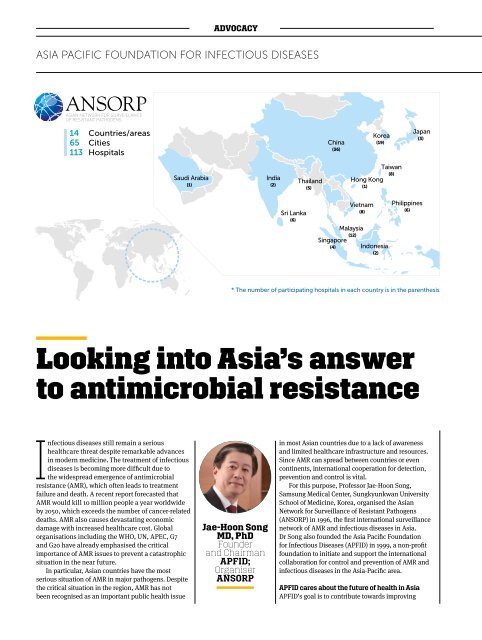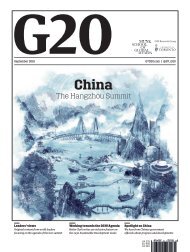G20-Germany-Hamburg-2017
mo.rami@trmg.co.uk
mo.rami@trmg.co.uk
Create successful ePaper yourself
Turn your PDF publications into a flip-book with our unique Google optimized e-Paper software.
ADVOCACY<br />
ASIA PACIFIC FOUNDATION FOR INFECTIOUS DISEASES<br />
14 Countries/areas<br />
65 Cities<br />
113 Hospitals<br />
China<br />
(36)<br />
Korea<br />
(19)<br />
Japan<br />
(3)<br />
Saudi Arabia<br />
(1)<br />
India<br />
(2)<br />
Thailand<br />
(5)<br />
Taiwan<br />
(8)<br />
Hong Kong<br />
(1)<br />
Sri Lanka<br />
(6)<br />
Singapore<br />
(4)<br />
Vietnam<br />
(8)<br />
Malaysia<br />
(12)<br />
Indonesia<br />
(2)<br />
Philippines<br />
(6)<br />
* The number of participating hospitals in each country is in the parenthesis<br />
Looking into Asia’s answer<br />
to antimicrobial resistance<br />
Infectious diseases still remain a serious<br />
healthcare threat despite remarkable advances<br />
in modern medicine. The treatment of infectious<br />
diseases is becoming more difficult due to<br />
the widespread emergence of antimicrobial<br />
resistance (AMR), which often leads to treatment<br />
failure and death. A recent report forecasted that<br />
AMR would kill 10 million people a year worldwide<br />
by 2050, which exceeds the number of cancer-related<br />
deaths. AMR also causes devastating economic<br />
damage with increased healthcare cost. Global<br />
organisations including the WHO, UN, APEC, G7<br />
and <strong>G20</strong> have already emphasised the critical<br />
importance of AMR issues to prevent a catastrophic<br />
situation in the near future.<br />
In particular, Asian countries have the most<br />
serious situation of AMR in major pathogens. Despite<br />
the critical situation in the region, AMR has not<br />
been recognised as an important public health issue<br />
Jae-Hoon Song<br />
MD, PhD<br />
Founder<br />
and Chairman<br />
APFID;<br />
Organiser<br />
ANSORP<br />
in most Asian countries due to a lack of awareness<br />
and limited healthcare infrastructure and resources.<br />
Since AMR can spread between countries or even<br />
continents, international cooperation for detection,<br />
prevention and control is vital.<br />
For this purpose, Professor Jae-Hoon Song,<br />
Samsung Medical Center, Sungkyunkwan University<br />
School of Medicine, Korea, organised the Asian<br />
Network for Surveillance of Resistant Pathogens<br />
(ANSORP) in 1996, the first international surveillance<br />
network of AMR and infectious diseases in Asia.<br />
Dr Song also founded the Asia Pacific Foundation<br />
for Infectious Diseases (APFID) in 1999, a non-profit<br />
foundation to initiate and support the international<br />
collaboration for control and prevention of AMR and<br />
infectious diseases in the Asia-Pacific area.<br />
APFID cares about the future of health in Asia<br />
APFID’s goal is to contribute towards improving
















